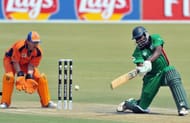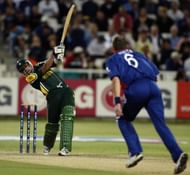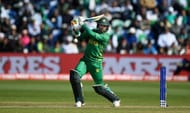Batting, for a number eleven batsman, has never been easy. Number elevens are generally the specialist bowlers on the side. Batsmen batting down the order follow a tradition of playing aggressive cricket and try to hit every ball in aspiration to score more runs for the side, but their all-or-nothing approach lands them into throwing their wickets away.
But there have been a few instances where these batsmen have put a price to their wicket and did not let go, instead ending up as the top-scorer in their innings.
Here are some instances where a number 11 batsmen top-scored for their teams in One-Day Internationals.
1) Christopher Pringle (New Zealand)
Christopher Pringle is a former New Zealand cricketer who was born in Auckland. He represented New Zealand in 14 Tests and 64 ODIs between 1990 and 1995.
He made his Test debut against Pakistan at Karachi in 1990/91 season. In just his third Test, he took his best bowling figures of 11-152, including 7-52 in the first innings of the match.
In 1994, in an ODI against the West Indies at Guwahati, Pringle became the first number eleven batsman in ODI history to top score for his team in an ODI against the Windies. He scored an unbeaten 34 runs in New Zealand's total of 171/9.
Although New Zealand lost the match by 165 runs, Pringle, with Dion Nash, went on to score an unbeaten partnership of 48 runs for the last wicket.
2) Peter Ongondo (Kenya)

Peter Ongondo is a right arm medium-pace bowler and lower-order power hitter who made his debut for Kenya against South Africa in 1999.
After his debut match, he had to wait for about two years to make his place in the squad.
After making a comeback for his side, he went on to top-score with a laudable 36 against West Indies in Nairobi. Ongondo with Jimmy Kamande had a partnership of 56 runs for the last wicket in that match and helped his team reach a total of 192, but they unfortunately lost the match to the Windies by 6 wickets.
3) Shane Bond (New Zealand)

Shane Bond is a former New Zealand cricketer who was considered the best Kiwi bowler after Sir Richard Hadlee.
He made his mark in his debut tri-series against the Aussies and the Proteas, where he took 21 wickets in 9 games and for his efforts, was adjudged the Player of the Tournament. His best ODI bowling figures of 6/19 came against India in 2005, which included the wickets of Rahul Dravid, Sourav Ganguly and Virender Sehwag.
In a group stage match of the 2002 Champions Trophy versus Australia, Shane Bond became the 3rd number eleven batsman in the world to top score the innings with a knock of 26 runs, although the Kiwis lost the match to the Aussies by 164 runs, chasing a target of 297.
4) Shoaib Akhtar (Pakistan)

The "Rawalpindi Express," as he is popularly known, is the fastest bowler in the history of cricket. The fastest ball ever to be bowled came against England in 2003 World Cup which was recorded to be at a speed of 161.3 km/h, and it still is a record even after 14 years. He is the only bowler in the world to cross the 100 mph mark twice at the international level.
While chasing a target of 247 against England in the 2003 ICC World Cup, Akhtar went on to score 43 runs off just 16 balls, with 5 fours and 3 huge sixes after Pakistan lost 9 of their batsmen for a mere 80 runs.
Akhtar and Mushtaq had a partnership of 54 runs for the last wicket, but that was not of much help as Pakistan lost the match by 112 runs.
5) Mohammad Amir (Pakistan)

Mohammad Amir is a left-arm fast bowler who made his international debut during the 2009 T20 World Cup.
His five-wicket maiden over against Australia in the final over of the game during the 2010 edition of the T20 World Cup (included 1 caught, 2 bowled and 2 run-outs by Kamran Akmal) was the only time in cricketing history where five wickets had fallen in a single over of an international game.
Amir holds the record for most number of runs (58) scored by a number 11 batsman in an ODI. His score of 58 came against England, where the Pakistan team were given a target of 445 runs to chase and eventually lost the match by 169 runs.
From Pakistan, Mohammad Amir and Sharjeel Khan were the joint top-scorers in this match with 58 runs. Yasir Shah and Amir did put up a fight with their partnership of 76 runs for the last wicket, but that wasn't enough to take them over the line.
Brand-new app in a brand-new avatar! Download Cric Rocket for fast cricket scores, rocket flicks, super notifications and much more!
